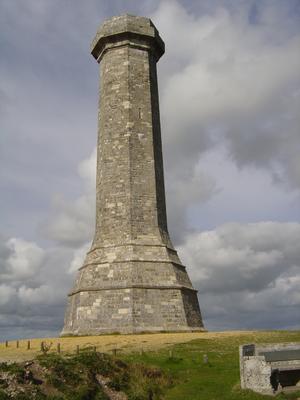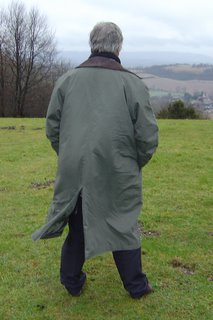
Sunday, and the wife and I are being diverted around
South Dorset as roadworks close the A31.
From Wimborne to Blandford through avenues of autumnal beech trees, it is a pleasant outing on a sunny and crystal clear day, and soon we pass
historic Dorchester and motor on in search of lunch at a seafood pub in Burton Bradstock.
We stop at the Hardy Monument, one of the highest points in the county and reflect on the popular misconception that this strange chimney stack (or is it an empty plinth) was put there to commemorate the life of Thomas Hardy the greatest writer to come out of those parts. The spectacular views soar for sixty miles or so and encompass everything from the Isle of Wight and Portland, Dorchester, Chesil Beach, Bridport, Paris probably (on a very clear day).
The monument of course was erected in 1844 to honour the other Thomas Hardy - Vice Admiral Sir Thomas Masterman Hardy (formerly Flag Captain of HMS Victory) who was born in nearby Portisham.
Readers of my recent blog about First Lieutenant George Joliffe, the nineteen-year-old killed on board HMS Bellerophon at the Battle of the Nile may be interested to know that Hardy was also at the Battle of the Nile (as well as Midshipman Aubrey, Admiral Nelson et al).
Poor Hardy. After the triumph of battle specially struck gold medals were awarded by the Admiralty to all the Captains who had commanded ships in the Bay of Aboukir, with the sad exception of Thomas Masterson Hardy, as he had only captained a brig.
Hardy is, of course best known for the death of Nelson and the famous dying words “Kiss me, Hardy”. History records that Hardy did plant a rather respectable kiss on the dying Nelson’s forehead and, a few minutes later, a second kiss on his cheek. But I am rather taken by the alternative version – that Nelson actually said “Kismet, Hardy” (using the popular Arabic word meaning “That’s Life” or “It’s the Will of Allah!”). How surprised the Admiral might have been in his dying moments to receive such a fond response. Modern historians assure me that the “kismet” theory is ludicrous, but I still like it.
 Sunday, and the wife and I are being diverted around
Sunday, and the wife and I are being diverted around 
No comments:
Post a Comment